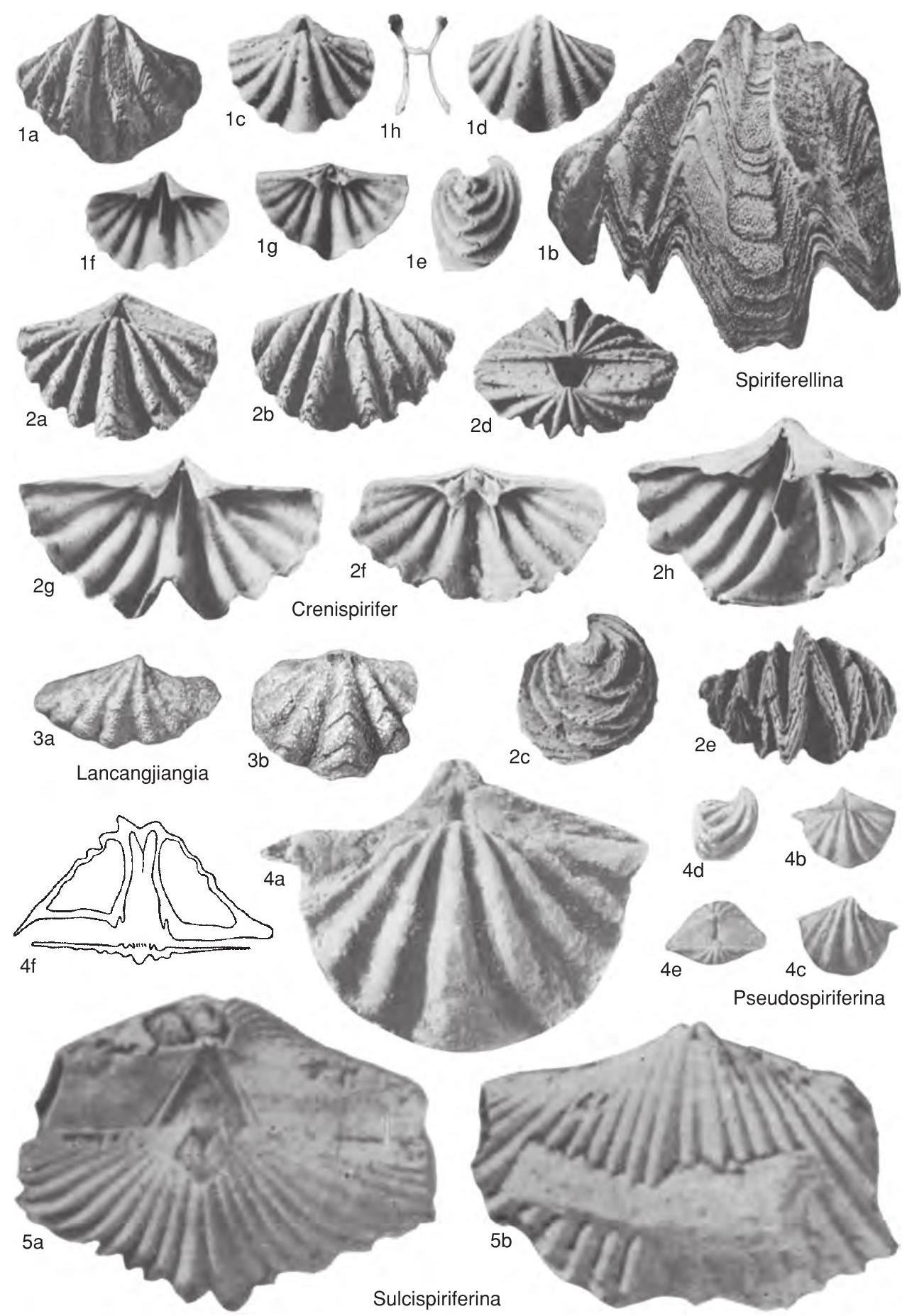Welcome to the Treatise on Invertebrate Paleontology!
Please enter a genera name to retrieve more information.

Spiriferellina
Classification
Phylum:
Brachiopoda
Subphylum:
Rhynchonelliformea
Class:
Rhynchonellata
Order:
Spiriferinida
Suborder:
Spiriferinidina
Superfamily:
Pennospiriferinoidea
Family:
Spiriferellinidae
Formal Genus Name and Reference:
Spiriferellina FREDERIKS, 1924, p. 299
Type Species:
Terebratulites cristatus von SCHLOTHEIM, 1816, p. 28, OD
Images
(Click to enlarge in a new window)
Fig. 1278, 1a-b. *S. cristata (vON Schlotheim), Lopingian, Germany, a, lectotype, ventral valve, X2, b, microornament, X5 (Campbell, 1959b).——Fig. 1278, 1c-h. S. tricosa Cooper & Grant, Guadalupian, Texas, USA, c-e, dorsal, ventral, and lateral views, X3, f-g, ventral and dorsal interiors, X1.5, h, jugum, X3 (Cooper & Grant, 1976b).
Synonyms
Tylotoma
Geographic Distribution
cosmopolitan
Age Range
Beginning Stage in Treatise Usage:
Carboniferous (Mississippian)
Beginning International Stage:
Tournaisian
Fraction Up In Beginning Stage:
0
Beginning Date:
359.3
Ending Stage in Treatise Usage:
Permian (Lopingian)
Ending International Stage:
Changhsingian
Fraction Up In Ending Stage:
100
Ending Date:
251.9
Description
Small, outline variable, usually moderately transverse, cardinal extremities variably rounded, angular or slightly mucronate, fold and sulcus narrow, delineated by coarse sulcus-bounding plicae and deep, wide, fold-bounding interspaces, ventral interarea moderately high, slightly concave, apsacline, lateral slopes with few high, coarse, subangular plicae separated by deep, subangular interspaces, sulcus smooth and rounded or sometimes flat bottomed, rarely with weak median rib, fold rounded, microornament of very fine, hollow pustules arranged in quincunx and covering external termination of punctae, growth laminae irregularly spaced, imbricate anteriorly, some species also with fine, hollow spinules, dental adminicula short, slightly divergent, median septum high, long, elongate ctenophoridium supported by umbonal callus, crural bases broad, converging below and in front of cardinal process in some species, dorsal adductor field bordered by low, thin ridges, jugum complete, punctae moderately coarse and regularly spaced
References
Museum or Author Information
Classification
Phylum:
Brachiopoda
Subphylum:
Rhynchonelliformea
Class:
Rhynchonellata
Order:
Spiriferinida
Suborder:
Spiriferinidina
Superfamily:
Pennospiriferinoidea
Family:
Spiriferellinidae
Formal Genus Name and Reference:
Spiriferellina FREDERIKS, 1924, p. 299
Type Species:
Terebratulites cristatus von SCHLOTHEIM, 1816, p. 28, OD
Images
(Click to enlarge in a new window)
Fig. 1278, 1a-b. *S. cristata (vON Schlotheim), Lopingian, Germany, a, lectotype, ventral valve, X2, b, microornament, X5 (Campbell, 1959b).——Fig. 1278, 1c-h. S. tricosa Cooper & Grant, Guadalupian, Texas, USA, c-e, dorsal, ventral, and lateral views, X3, f-g, ventral and dorsal interiors, X1.5, h, jugum, X3 (Cooper & Grant, 1976b).
Synonyms
Tylotoma
Geographic Distribution
cosmopolitan
Age Range
Beginning Stage in Treatise Usage:
Carboniferous (Mississippian)
Beginning International Stage:
Tournaisian
Fraction Up In Beginning Stage:
0
Beginning Date:
359.3
Ending Stage in Treatise Usage:
Permian (Lopingian)
Ending International Stage:
Changhsingian
Fraction Up In Ending Stage:
100
Ending Date:
251.9
Description
Small, outline variable, usually moderately transverse, cardinal extremities variably rounded, angular or slightly mucronate, fold and sulcus narrow, delineated by coarse sulcus-bounding plicae and deep, wide, fold-bounding interspaces, ventral interarea moderately high, slightly concave, apsacline, lateral slopes with few high, coarse, subangular plicae separated by deep, subangular interspaces, sulcus smooth and rounded or sometimes flat bottomed, rarely with weak median rib, fold rounded, microornament of very fine, hollow pustules arranged in quincunx and covering external termination of punctae, growth laminae irregularly spaced, imbricate anteriorly, some species also with fine, hollow spinules, dental adminicula short, slightly divergent, median septum high, long, elongate ctenophoridium supported by umbonal callus, crural bases broad, converging below and in front of cardinal process in some species, dorsal adductor field bordered by low, thin ridges, jugum complete, punctae moderately coarse and regularly spaced
